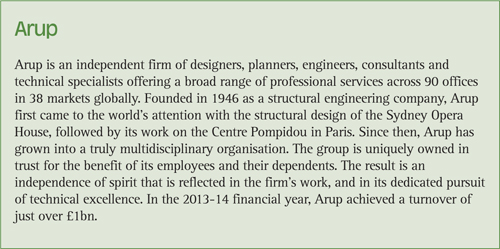

- Richard Abigail
- Group Treasurer, Arup
by Richard Abigail, Group Treasurer, Arup
In December 2014, global consulting and engineering company Arup, supported by partner bank HSBC, became the first corporation outside of the Shanghai Free Trade Zone (SFTZ) to perform an automated, cross-border RMB sweep between Shanghai and London. This landmark transaction has enabled Arup to integrate its onshore RMB (CNY) account into its global cash pool, a major step forward in global liquidity management. In this article, Richard Abigail, Group Treasurer, Arup, discusses the group’s recent global cash pooling initiative, and its extension into mainland China.

Treasury organisation
We have centralised a number of corporate functions into centres of excellence based in London, including group treasury. Group treasury includes two people who take responsibility for front office, advisory services, debt issuance, bank guarantees, cash and risk management, while back office processing is done through our shared service centre (SSC).
Liquidity optimisation
Over the past few years, we have been proactive in optimising liquidity management. In the past, liquidity was very fragmented without a robust approach to credit risk. For example, we held £100m with a single bank, but only 5% was available to group treasury. We approached HSBC, our primary partner bank, based on the quality of the existing relationship, the bank’s global footprint (for example, Arup is also headquartered in Hong Kong and London), the similarities in our approach to risk, and HSBC’s specific expertise in liquidity management. With HSBC’s help, we first launched our global multi-currency cash pool in 2011, initially manually, but subsequently the pooling process has been automated. Over the next three years, we integrated most of our entities located in 19 open economies, such as UK, Singapore, Australia and Hong Kong, as well as our captive insurance company, which is not possible with all banks.
While it was relatively straightforward to consolidate cash across most of our entities, it was more challenging as we extended our group liquidity strategy to regions such as United States and China. Some of these difficulties were internal, while in other cases, particularly China, cash pooling has been constrained by regulatory requirements. In these cases, we have taken a step-by-step approach. For example, when we extended our cash pool to the US, we originally set up a $5m buffer, but treasury now has control over 100% of this cash.
Overcoming liquidity challenges in China
Arup has had a presence in China for 30 years, and now employs 850 people in the country following a period of rapid growth. We have used RMB for cross-border trade for some years, both for intercompany and third party flows. Settling intercompany invoices in RMB has resulted in a steady flow of RMB coming out of China, and we have experienced no difficulties in integrating our offshore RMB (CNH) account into our global cash pool. In addition, however, our cash balance in China was growing, but cash was effectively ‘trapped’, so we invested locally and accepted the exposure to RMB volatility.

However, with recent regulatory changes in China, we have finally been able to integrate cash in China within our global liquidity strategy. We took a two-step approach to achieving this. We have one entity in China, but with numerous branches, each of which had separate accounts, so our first step was to pool cash in-country. Secondly, we looked at how we could integrate this pool account into our global cash pool. While we knew that some corporates were using techniques such as entrust loans to transfer cash offshore, we were seeking a more convenient solution that was consistent with our global liquidity strategy.[[[PAGE]]]
Two-way cross-border sweeping
In December 2014, supported by HSBC, we performed our first automated cross-border RMB sweep between Shanghai and London, the first company to do so outside of the Shanghai Free Trade Zone (SFTZ). This has resulted in successfully integrating our onshore RMB (CNY) pool account into our global multi-currency cash pool with HSBC with two-way sweeping. This sweeping arrangement operates on a target balance basis: any cash in our domestic cash pool header account above RMB 40m is automatically pooled into our UK-based treasury fund; if the balance falls below this level, funds are automatically swept back from London. We will review this target balance annually to ensure that we are meeting our day-to-day needs effectively.
Outcomes and achievements
By connecting China into our global cash pool, we have significantly enhanced our liquidity position both in China and globally. We are managing our credit risk and liquidity far more effectively, with more than 80% of global cash now available to treasury. With treasury achieving visibility and control over cash on a group-wide basis, and entities globally able to tap into group liquidity, we have reduced the need for external borrowing and eliminated the ‘cash fiefdoms’ of the past. As a result, we have calculated savings of around £1m each year in addition to the less tangible, but equally important benefits of improved operational, credit and financial risk management.
Future plans
We have some additional countries in which we have a smaller presence to add into the cash pool, such as Canada and Dubai, and we will also automate our cash sweeping into and out of Poland, but we aim to finish this by end of quarter one, 2015. In addition, we recently implemented a new treasury management system (TMS), SunGard’s Integrity solution, which is proving very successful. We plan to increase the number of banks with which we integrate by using SWIFT, probably through Alliance Lite2. In addition, we intend to extend the number of entities we support through the TMS from UK and Ireland to our global business. Once we have done this, as well as completing our cash pooling project, we will be able to take a more proactive approach not only to managing liquidity but also risk, such as FX risk.










